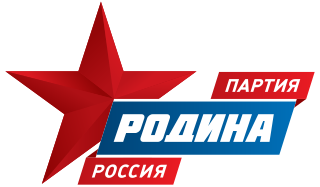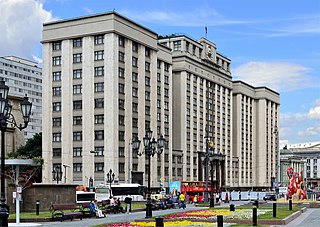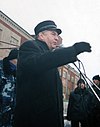
The All-Russian Political Party "United Russia" is the ruling political party of Russia. As the largest party in the Russian Federation, it holds 325 of the 450 seats in the State Duma as of 2022, having constituted the majority in the chamber since 2007.

On the federal level, Russia elects a president as head of state and a parliament, one of the two chambers of the Federal Assembly. The president is elected for, at most, two consecutive six-year terms by the people. The Federal Assembly has two chambers. The State Duma has 450 members, elected for five-year terms. The Federation Council is not directly elected; each of the 85 federal subjects of Russia sends 2 delegates to the Federal Council, for a total of 170 members.

The Union of Right Forces, was a Russian liberal-conservative political public organization and former party, initially founded as an electoral bloc in 1999 and associated with free market reforms, privatization, and the legacy of the "young reformers" of the 1990s: Anatoly Chubais, Boris Nemtsov, Sergey Kiriyenko and Yegor Gaidar. The party officially self-dissolved in 2008. Nikita Belykh was the party's last leader from 2005 to 2008.

The State Duma, commonly abbreviated in Russian as Gosduma, is the lower house of the Federal Assembly of Russia, while the upper house is the Federation Council. The Duma headquarters are located in central Moscow, a few steps from Manege Square. Its members are referred to as deputies. The State Duma replaced the Supreme Soviet as a result of the new constitution introduced by Boris Yeltsin in the aftermath of the Russian constitutional crisis of 1993, and approved in a nationwide referendum.

The All-Russian Political Party "Rodina" is a nationalist political party in Russia. It was a coalition of thirty nationalist groups that was established by Dmitry Rogozin, Sergey Glazyev, Sergey Baburin, Viktor Gerashchenko, Georgy Shpak, Valentin Varennikov and others in August 2003. The party's ideology combines "patriotism, nationalism, and a greater role for the government in the economy", and is described as pro-Kremlin. Its headquarters is located in Moscow.

Legislative elections were held in Russia on 2 December 2007. At stake were the 450 seats in the 5th State Duma, the lower house of the Federal Assembly. Eleven parties were included in the ballot, including Russia's largest party, United Russia, which was supported by President of Russia Vladimir Putin. Official results showed that United Russia won 64.3% of the votes, the Communist Party of the Russian Federation 11.6%, the Liberal Democratic Party of Russia 8.1%, and Fair Russia won 7.7%, and none of the other parties won enough votes to gain any seats.

A Just Russia – For Truth, formerly A Just Russia (SR), also referred to as Fair Russia, is a social conservative and social-democratic political party in Russia. The party is considered to be part of the "systemic opposition", but is generally sympathetic to the agenda of incumbent president Vladimir Putin, including his foreign policy.

The Congress of Russian Communities is a political organization in Russia. It was created in the early 1990s initially to promote the rights of ethnic Russians living in the newly independent countries of the former Soviet Union.

Great Russia is an unregistered far-right nationalist political party in Russia. The party has been led by former Rodina deputy Andrei Saveliyev since its founding.

Legislative elections were held in Russia on 4 December 2011. At stake were the 450 seats in the 6th State Duma, the lower house of the Federal Assembly. United Russia won the elections with 49.32% of the vote, taking 238 seats or 52.88% of the Duma seats.

Sergey Sergeyevich Mitrokhin is a Russian politician.

The Communist Party of the Russian Federation is a communist political party in Russia that officially adheres to Marxist–Leninist philosophy. It is the second-largest political party in Russia after United Russia. The youth organisation of the party is the Leninist Young Communist League.

The elections for the 5th convocation of the Moscow City Duma took place on 11 October 2009. Out of the 35 deputies, 18 were elected through party lists using proportional representation, while the remaining 17 were elected from single-member constituencies. In order to secure seats in the City Duma through proportional representation, parties needed to surpass a 7% popular vote threshold. The term of office for the newly elected City Duma members is five years, which was extended from the previous four-year term.

The Communist Party "Communists of Russia" or simply Communists of Russia is an anti-revisionist Marxist–Leninist communist party in Russia. Communists of Russia was founded in May 2009 as a public non-commercial organisation, and officially registered as a political party in April 2012.

Aleksey Aleksandrovich Zhuravlyov is a Russian nationalist politician and member of the State Duma. Since September 29, 2016 he has been chairman of the Rodina political party. His views are often militarist, hawkish, and irredentist.

The State Duma of the Federal Assembly of the Russian Federation of the 7th convocation is a former convocation of the lower house of Russian parliament.

Legislative elections were held in Russia from 17 to 19 September 2021. At stake were 450 seats in the 8th convocation of the State Duma, the lower house of the Federal Assembly. Going into the elections, United Russia was the ruling party after winning the 2016 elections with 343 of the 450 seats, and retaining a supermajority. In March 2020, it was proposed to hold a snap election in September 2020 due to proposed constitutional reforms, but this idea was abandoned. On 18 June 2021 Vladimir Putin signed a decree calling the election for 19 September the same year. Owing to the COVID-19 pandemic in Russia, voting in the election lasted for three days, from 17 to 19 September. Final turnout was reported to be 51.72%.

The election for the 6th convocation of the Moscow City Duma took place on 14 September 2014, which coincided with the United Voting Day. The elections were conducted using the first-past-the-post voting system, and a total of 45 deputies were elected in 45 single-member constituencies from a pool of 258 candidates. The term for the new Duma was set at five years. The voting process occurred across more than 3,500 polling stations throughout the city. The final results of the election were announced on September 16, 2014.

Russian legislative elections are a procedure of determining the composition of the State Duma, the lower house of the Russian parliament, for the next five years through universal, direct, and secret voting of 450 deputies.
Victoria Rodina is a Russian political figure and a deputy of the 8th State Duma.



























